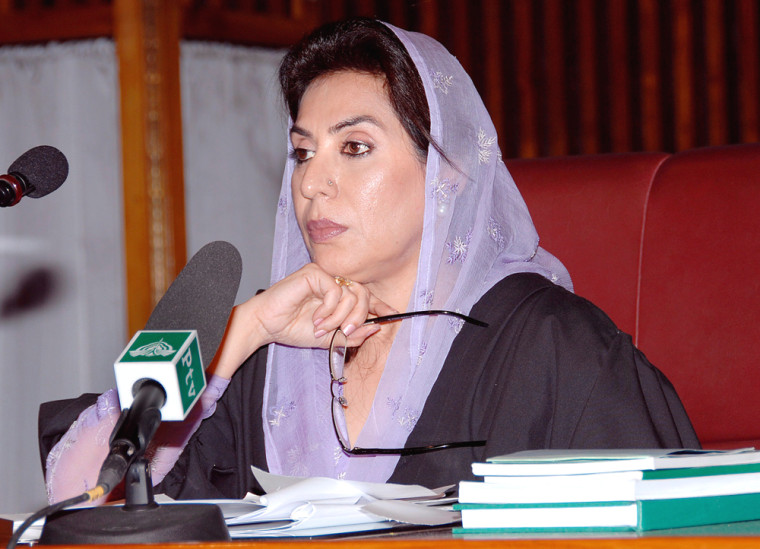Pakistan's new parliament elected on Wednesday a supporter — and passable lookalike — of assassinated former leader Benazir Bhutto as the country's first female speaker of parliament.
Fehmida Mirza's elevation reflected an air of liberalism blowing through Pakistan politics since voters rejected allies of the country's former military strongman in last month's elections.
But there are doubts that the return to power of elitist parties, tainted with corruption in the eyes of many Pakistanis, heralds an end to gathering Islamic extremism and economic hardships.
In a first sign of trouble, the new leaders have been struggling to agree on which of them should be prime minister.
Mirza, a businesswoman and medical doctor elected to parliament three times, won 249 of the 324 votes cast in a ballot in the National Assembly, or lower house. Israr Tareen, a coal-mining magnate and supporter of President Pervez Musharraf, got only 70. Five ballots were invalid.
"Being a woman, it gives me immense pride and happiness to see you on that chair," said Saima Akhtar Bharwana, a lawmaker from Bhutto's party, after Mirza had been sworn in.
"You do resemble (Bhutto) and I wish and hope that you do resemble her and match her, match in intelligence and wit that she possessed," Bharwana said.
Sympathy over Bhutto's death in a gun-and-suicide-bomb attack on Dec. 27 helped carry her Pakistan People's Party to first place in Feb. 18 parliamentary elections. The party is preparing to lead a new coalition government united against Musharraf after eight years of his military rule.
The achievement of Mirza, 51, is modest compared to that of her late party leader, who was the first woman to head the government of a Muslim-majority country in the modern age.
Improving Pakistan's image
Tariq Azim, a senator for Musharraf's defeated party, said Mirza's appointment would improve Pakistan's image in the world — long tainted by reports of widespread rights abuses against women.
"The house will be more disciplined and better managed as you know there is more respect for a woman in our country," Azim said.
As her victory was announced, lawmakers from both political camps slapped their desks loudly by way of applause.
Mirza stood, smiled modestly and repeatedly touched her forehead in a gesture of thanks to her peers. She then donned the black robe of office and took the oath from the outgoing speaker.
Mirza, who has vowed to run parliament "like a home," got straight down to business, inviting Chaudhry Pervez Elahi, the new opposition leader, to speak first.
Elahi said the opposition would avoid the desk-thumping and scuffling in parliament that in the past made Pakistan almost ungovernable and paved the way for repeated military takeovers.
Presidential cooperation
Musharraf has promised to cooperate with the new government. In a speech at an army academy on Wednesday, he stressed the importance of economic growth and urged the country to "join hands together to eliminate the scourge of extremism," a military statement said.
But Javed Hashmi, a lieutenant of former premier Nawaz Sharif, whose government was ousted in the 1999 coup, indicated that the ex-general could expect a rough ride.
He insisted that parliament — where Sharif's party has allied itself with Bhutto's — would not rubber-stamp the acts of a "dictator" — a reference to Musharraf's declaration of emergency rule in November to safeguard his disputed re-election as president from legal challenges.
"We have to bury the dictatorship," Hashmi said. He also demanded that the defense budget should be presented before the National Assembly for unprecedented scrutiny.
Parliament could try to impeach Musharraf or restore Supreme Court judges ousted during the emergency. Some analysts warn that Musharraf could team up with the current judges to resist — casting the country into a new political crisis.
Fighting for leadership
Bhutto's party, now led by her widower Asif Ali Zardari, must first decide who should be the prime minister.
After Bhutto's death, Zardari told reporters that she had wanted Makhdoom Amin Fahim, an aristocratic party stalwart, to be their candidate.
But there is speculation that Zardari wants the job himself. He is currently ineligible because he is not a member of parliament, but could name a stand-in and run in a by-election within months.
The battle for the leadership has strained party unity, and in an apparent effort to smooth over the row, the son of Bhutto and Zardari flew to Pakistan on Wednesday.
The party appointed Bilawal Bhutto Zardari as chairman after his mother died, though his father is running things while the 19-year-old continues his studies at Oxford University.
While he has little or no say in politics, it could be difficult for party loyalists to publicly criticize a declaration on the leadership made by Bhutto's anointed heir.
The People's Party said Bilawal was visiting his mother's grave Wednesday and would announce the nomination "at the right time."
